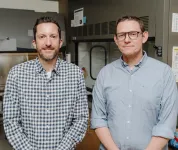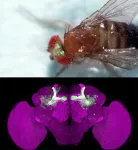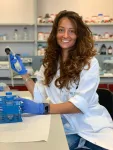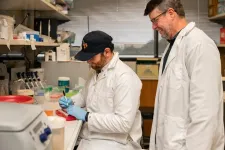(Press-News.org) A special brain-wave cap can diagnose stroke in the ambulance, allowing the patient to receive appropriate treatment faster. Jonathan Coutinho, neurologist at Amsterdam UMC, is one of the inventors the swimming cap: "Our research shows that the brain-wave cap can recognize patients with large ischemic stroke with great accuracy. This is very good news, because the cap can ultimately save lives by routing these patients directly to the right hospital." The research is published today in Neurology.
Every year, millions of people worldwide suffer an ischemic stroke, the most common type of stroke. An ischemic stroke occurs when a blood clot blocks a blood vessel of the brain, causing a part of the brain to receive no or insufficient blood. Prompt treatment is crucial to prevent permanent disability or death.
Neurologist Jonathan Coutinho, Technical Physician Wouter Potters and professor of Radiology Henk Marquering, all from Amsterdam UMC, invented the brain-wave cap, which allows an EEG (brain wave test) to be carried out in the ambulance. This brain wave test shows whether there is an ischemic stroke and whether the blocked cerebral blood vessel is large or small. This distinction determines the treatment: in case of a small ischemic stroke, the patient receives a blood thinner, and in case of a large ischemic stroke, the blood clot must be removed mechanically in a specialized hospital. "When it comes to stroke, time is literally brain. The sooner we start the right treatment, the better the outcome. If the diagnosis is already clear in the ambulance, the patient can be routed directly to the right hospital, which saves valuable time," says Coutinho.
Between 2018 and 2022, the smart brain-wave cap was tested in twelve Dutch ambulances, with data collected from almost 400 patients. The study shows that the brain-wave cap can recognize patients with a large ischemic stroke with great accuracy. "This study shows that the brain-wave cap performs well in an ambulance setting. For example, with the measurements of the cap, we can distinguish between a large or small ischemic stroke," adds Coutinho.
In order to develop the brain-wave cap into a product and bring it to the market, TrianecT, an Amsterdam UMC, spin-off company was founded in 2022. In addition, a follow-up study (AI-STROKE) is currently ongoing in which even more measurements are collected in order to develop an algorithm for improved recognition of a large ischemic stroke in the ambulance. The Dutch Heart Foundation has also recognised the importance of this research and has made 4 million euros available for large-scale research into faster treatment of ischemic stroke.
END
Smart brain-wave cap recognizes stroke before the patient reaches the hospital
Amsterdam UMC designs brain-wave cap that can send patients to the correct hospital directly from the ambulance
2023-10-17
ELSE PRESS RELEASES FROM THIS DATE:
Researchers receive $423,500 for study to improve outcomes from fungal infections
2023-10-17
Aspergillus fumigatus is the major airborne fungus present indoors and outdoors that causes various diseases, the severity of which are dependent on an individual’s immune status.
Researchers in the College of Pharmacy at the University of Tennessee Health Science Center have received a $423,500 grant from the National Institute of Allergy and Infectious Diseases (NIAID) of the National Institutes of Health for research aimed at reducing disease and mortality rates associated with Aspergillus infections ...
Air pollution and breast cancer risk - a link that calls for political action
2023-10-17
Lugano, Switzerland, 17 October 2023 – Women living and working in places with higher levels of fine particle air pollution are more likely to get breast cancer than those living and working in less polluted areas. Results of the first study to take account of the effects of both residential and workplace exposure to air pollution on breast cancer risk are presented at the ESMO Congress 2023 in Madrid, Spain (1).
“Our data showed a statistically significant association between long term exposure to fine particle air pollution, at home and at work, and risk of breast cancer. This contrasts with previous research which looked only at fine particle exposure ...
Thermosensation is critical for the survival of animals, but the mechanisms by which this is modulated by nutritional status remain unclear
2023-10-17
Thermosensation is critical for the survival of animals, but the mechanisms by which this is modulated by nutritional status remain unclear; here, behavioral and live brain imaging studies reveal why food-sated fruit flies prefer to stay at relatively higher temperatures compared to hungry flies.
#####
In your coverage, please use this URL to provide access to the freely available paper in PLOS Biology: http://journals.plos.org/plosbiology/article?id=10.1371/journal.pbio.3002332
Article Title: Independent insulin signaling modulators govern hot avoidance ...
Multi-drug resistant strain of E.coli battles bacteria in healthy gut
2023-10-17
Different strains of E.coli can outcompete one another to take over the gut, a new study reveals.
Publishing their findings today in PLOS Biology, scientists reveal that a particular strain, known as MDR ST131, can readily colonise new hosts, even if those hosts are already have E.coli in their healthy gut.
The international team, led by experts at the University of Birmingham, used a mouse model to help understand why strains of E.coli that live in a healthy gut are rapidly overtaken of when challenged with a multi-drug resistant strain.
Lead author Professor Alan McNally, from ...
Sleep and stress give clues to understanding epileptic seizures - study
2023-10-17
Sleeping patterns and stress hormones could be the key to understanding how and when people with epilepsy are likely to experience seizures, a new study reveals.
Researchers used mathematical modelling to understand the impact of different physiological processes, such as sleep and changes in concentration of the stress-hormone cortisol, on key signatures of epilepsy – known as epileptiform discharges (ED).
Epilepsy is a serious neurological disorder characterised by a tendency to have recurrent, spontaneous seizures. Classically, seizures were assumed to occur at random, until the discovery of ED activity with timescales that vary from hours and days through to months.
The scientists ...
The Dompé Foundation launches 16 scholarships for neuroscience and neurobiology students in the US
2023-10-17
The Dompé Foundation is offering 16 scholarships to support neuroscience and neurobiology students enrolled at US universities for the academic year 2023/2024. This funding opportunity, which honors the legacy of the only female Italian Nobel laureate in Medicine, is intended for promising candidates from any nationality that have already been admitted to a Master’s, PhD or post-doc program. With a total budget of up to about 1 million USD, the Foundation has doubled from the previous two years its funding for the US project, ...
NASA September 2023 temperature data shows continued record warming
2023-10-17
Continuing the temperature trend from this summer, September 2023 was the hottest September on record, according to scientists at NASA’s Goddard Institute for Space Studies (GISS). The month also set the record for the highest temperature anomaly – the largest difference from the long-term average.
This visualization shows global temperature anomalies along with the underlying seasonal cycle. Temperatures advance from January through December left to right, rising during warmer months and falling during cooler months. The color of each line represents the year, with colder purples for the 1960s and warmer oranges and yellows for more recent ...
Researchers test seafloor fiber optic cable as an earthquake early warning system
2023-10-17
One of the biggest challenges for earthquake early warning systems (EEW) is the lack of seismic stations located offshore of heavily populated coastlines, where some of the world’s most seismically active regions are located. In a new study published in The Seismic Record, researchers show how unused telecommunications fiber optic cable can be transformed for offshore EEW.
Jiuxun Yin, a Caltech researcher now at SLB, and colleagues used 50 kilometers of a submarine telecom cable running between the United States and Chile, sampling ...
Researchers receive NIH grant to improve quality of life for people with Down syndrome
2023-10-17
A team of researchers at the Texas A&M University School of Veterinary Medicine & Biomedical Sciences (VMBS) has received a grant from the National Institutes of Health (NIH) to research metabolism in people with Down syndrome.
By targeting genes that affect metabolism, the team may be able to develop drug therapies for physical and mental symptoms of the condition, like muscle loss, accelerated aging, and lower cognitive function, thereby improving the quality of life for people with Down syndrome.
The new grant will also make Dr. Weston Porter, a professor in the VMBS Department of Veterinary Physiology & Pharmacology and lead researcher ...
Miniaturized FSO breakthrough unlocks high-speed wireless communication anywhere
2023-10-17
In a world that relies on high-speed internet and seamless communication, the absence of a reliable fiber connection can be a significant hurdle. Fortunately, a cutting-edge technology known as free-space optical communication (FSO) offers a flexible solution for field-deployable high-speed wireless communication in areas where fiber connections are unavailable.
FSO has garnered attention for its versatility across various scales of operation. On a global level, it plays a crucial role in establishing high-speed satellite internet projects like Starlink, ensuring global connectivity. At the ground level, ...
LAST 30 PRESS RELEASES:
Researchers develop new strategy for improving inverted perovskite solar cells
Yes! The role of YAP and CTGF as potential therapeutic targets for preventing severe liver disease
Pancreatic cancer may begin hiding from the immune system earlier than we thought
Robotic wing inspired by nature delivers leap in underwater stability
A clinical reveals that aniridia causes a progressive loss of corneal sensitivity
Fossil amber reveals the secret lives of Cretaceous ants
Predicting extreme rainfall through novel spatial modeling
The Lancet: First-ever in-utero stem cell therapy for fetal spina bifida repair is safe, study finds
Nanoplastics can interact with Salmonella to affect food safety, study shows
Eric Moore, M.D., elected to Mayo Clinic Board of Trustees
NYU named “research powerhouse” in new analysis
New polymer materials may offer breakthrough solution for hard-to-remove PFAS in water
Biochar can either curb or boost greenhouse gas emissions depending on soil conditions, new study finds
Nanobiochar emerges as a next generation solution for cleaner water, healthier soils, and resilient ecosystems
Study finds more parents saying ‘No’ to vitamin K, putting babies’ brains at risk
Scientists develop new gut health measure that tracks disease
Rice gene discovery could cut fertiliser use while protecting yields
Jumping ‘DNA parasites’ linked to early stages of tumour formation
Ultra-sensitive CAR T cells provide potential strategy to treat solid tumors
Early Neanderthal-Human interbreeding was strongly sex biased
North American bird declines are widespread and accelerating in agricultural hotspots
Researchers recommend strategies for improved genetic privacy legislation
How birds achieve sweet success
More sensitive cell therapy may be a HIT against solid cancers
Scientists map how aging reshapes cells across the entire mammalian body
Hotspots of accelerated bird decline linked to agricultural activity
How ancient attraction shaped the human genome
NJIT faculty named Senior Members of the National Academy of Inventors
App aids substance use recovery in vulnerable populations
College students nationwide received lifesaving education on sudden cardiac death
[Press-News.org] Smart brain-wave cap recognizes stroke before the patient reaches the hospitalAmsterdam UMC designs brain-wave cap that can send patients to the correct hospital directly from the ambulance





